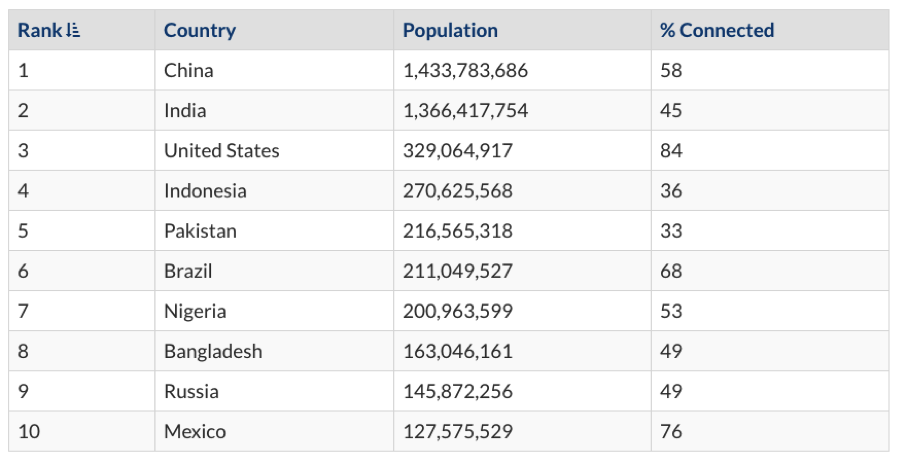2020 will go down as a year of transformation. A global pandemic, looming recessions, unprecedented natural disasters, record unemployment rate fluctuations, and radical social movement changes, all within a historic US presidential election year, are just a few of the developments that will earmark the beginning of this decade in history books to come.
However, in spite of all of these unnerving changes, my contention for this inaugural post is human progress, powered by the Internet, is still a more significant smilestone.
It has changed the way we communicate, the way we plan, our financial systems, banking, credit management, our global supply chains, last mile fulfillment, education, how we find love, language development, government influence, journalism, content distribution, travel, healthcare, telecommunications, urban planning, defense systems, economic development, travel, energy production, global policy, our ability to appreciate our past, entertainment, continuous learning, and our access and payment for goods and services, just for starters.
How, 49 years after the first email was sent, can we collectively underappreciate the magnitude of this invention?
Speaking from a North American perspective, part of the answer lies within the Internet’s ubiquitous (tellingly, the most direct synonym is omnipresent) nature itself. Its permeation into most, if not all, corners of modern society has boosted the opportunities for distraction and productivity simultaneously:
Nearly seven hours per day are spent online.
That’s more than one-in-four minutes, or more time than we invest in any other activity other than sleeping, on average.
Some statistics are worth repeating in the attempt to grasp historic change: we spend more time on the Internet, whether for work or personal, than we do raising our children, enjoying nature or spending undistracted time with loved ones.
And yet, although we’ve embraced this level of invasiveness, only 59% of the global population is on the Internet.
Thinking back to my undergraduate degree, a 59% grade doesn’t advance you into a passing state, but we’re getting there (as of July 2020, according to publicly available data from our friends at Statista) The dizzying potential of innovation and change with so many untapped minds is certainly worth getting excited about.
As Internet analyst J. Clement summarized, “By now, a world without the internet is unimaginable. Connecting billions of people worldwide, the internet is a core pillar of the modern information society.”
It’s certainly worth noting these rates vary widely country by country. For example, the United States is at 84% of 2020. The high-end of the range includes Japan (91%), the UK (95%), South Korea (95%), United Arab Emirates (95%) and Netherlands (98%). On the low end of this range you’ll find North Korea (0%), Somalia (2%) and Chad (5%). These three countries’ combined populations total approximately 56 million people, or more than the number of US citizens that are not online as of fall 2020.
As these underrepresented global citizens get connected, their influence and contributions to worldwide culture, thinking and economics will grow too. Based on our understanding of humankind, this has never happened in history.
Largest Countries, By Population, With The Approximate Percentage Of People Connected To The Internet
Source: Cybercrime Magazine July 2019
Is 100% global population connectivity achievable? Only time will tell. Granted, there are a host of larger reasons for Internet disparity and the purpose of this post is not to cover them holistically. That said, considering Internet users are growing at an annual rate that’s 4.4 times greater than total population growth, change is inevitable. This rate in real numbers equates to approximately 367 million new users per year, or more than the United States’ entire population, the third most populous country on the planet.
Of the myriad of directions this socioeconomic, technological and cultural revolution could take, we’d like to present a single (admittedly small, but simple) development to consider as an example:
The audio revolution – how a species will regain “lost time”
In the age of artificial intelligence, Internet of Things and implanted neural devices, at first glance it might appear strange to reference audio as being revolutionary, but consider the following: people waste an inordinate amount of time on mundane tasks.
According to data from The Bureau of Labor, the typical American spends over 12% of their lifetime commuting and cleaning the house, or 2.88 hours daily. That equates to ~1,051 hours per year. Considering the average four-year Bachelor’s degree requires 600 “real hours” to graduate, typically over the course of 40 months, this time is absolutely underleveraged.
Even more significantly, Inc. Magazine columnist Jeanine Skowronski estimates up to 84% of an average year is spent on the “daily grind”, which includes a much broader range of categories. For the typical person in a western economy, the realistic percent of time “lost” is likely somewhere between 12% – 84%, but let’s continue with the low end of this range for conservative approximation:
What could you accomplish with the equivalent of 1.8 undergraduate degrees’ worth of time every year?
In short, we don’t know the answer (yet). What we do know is the amount of information on the Internet continues to grow year over year while the power of the spoken word continues to expand rapidly.
Consider the self-reported statistic that Google, the world’s largest search engine, has indexed just 0.004% of all content present on the Internet. This begins to paint the picture of the breadth of information available online. Additionally, new content is added each and every day at a staggering rate: more than 5 million new blog posts are published daily, over 5,000 domain names are registered hourly and over 400 hours of content is uploaded to YouTube every single minute.
Simultaneously, podcasts, a primary way to access the written word in a convenient, audio format, continue to grow.
According to Podcast Insights, 51% of the US population has listened to a podcast, with the average listener following seven different shows per week in 2019, up from five two years prior. Oftentimes, this occurs at home or while commuting, allowing “lost” time to be leveraged in a compelling way. We believe this growth will continue.
On a global level, according to Deloitte in 2020, “…the global audiobook market will grow by 25 percent to US$3.5 billion. And audiobooks aren’t the only audio format gaining in popularity. We also predict that the global podcasting market will increase by 30 percent to reach US$1.1 billion in 2020, surpassing the US$1 billion mark for the first time.
“These numbers may not look like much next to radio’s US$42 billion and music’s (recorded and live) US$51 billion global annual revenues. But in a world where overall media and entertainment growth stands at just 4 percent, 25 to 30 percent annual growth is impressive, even considering the low absolute base. The signal is clear: Audiobooks and podcasts are outgrowing their “niche” status to emerge as substantive markets in their own right.”
These trends have not gone unnoticed by some of the world’s most prominent lecturers. Former Harvard Professor Dr. Jordan Peterson has stated “ (YouTube) technology has transformed the landscape” of education, referring to it as the “modern day Gutenberg press”:
“…it allows the spoken word to have the same reach and longevity as a book. For the first time in human history, spontaneous speeches can reach an infinite audience for an unspecified duration of time. Well, that’s a whole new thing.
“With a YouTube video, if you convert it to a podcast…you all of a sudden have way more time than you used to have. Because you can listen to a podcast while you’re doing other things, so you can do the mundane things that you have to do from day-to-day, like commute and so on, but you can (also) listen to a podcast.”
Our prediction is we have yet to seen the upper limits of this expansion and its contribution to society and our shared global future, powered by the Internet.
When taking into account unprecedented growth rates with less than two-thirds of the global population online at the time this blog was published, the endless possibilities and potential from this revolution becomes more worthwhile to ponder.
* Disclaimer: We would be remiss if we didn’t acknowledge the devastation COVID-19 has been for the lives of millions of people, many close friends and family members we know personally included. This blog post was not intended to detract from this suffering or potential loss, whether economic or personal, in any way, shape or form.
